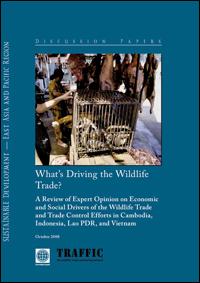South-east Asia is both a centre for the consumption of wildlife products, and also a key supplier of wildlife products to the world. Cambodia, Indonesia, Lao PDR and Vietnam are among the south-east Asian countries that act as major sources of wildlife in trade, the trade involving a wide variety of native species, which, in many cases, are declining as a result of unsustainable, and often illegal, harvest. In 2005, with funding support from the World Bank-Netherlands Partnership Program, TRAFFIC initiated a study to better understand the economic and social drivers of the wildlife trade in these four countries, and to assess the effectiveness of interventions that have been employed to halt illegal and unsustainable trade in their native flora and fauna. The study aimed to generate findings and recommendations that would be useful to governments, nongovernmental organisations, donors and others in considering how interventions to reduce illegal and unsustainable wildlife trade might be applied more effectively in future.
Includes bibliographic references

